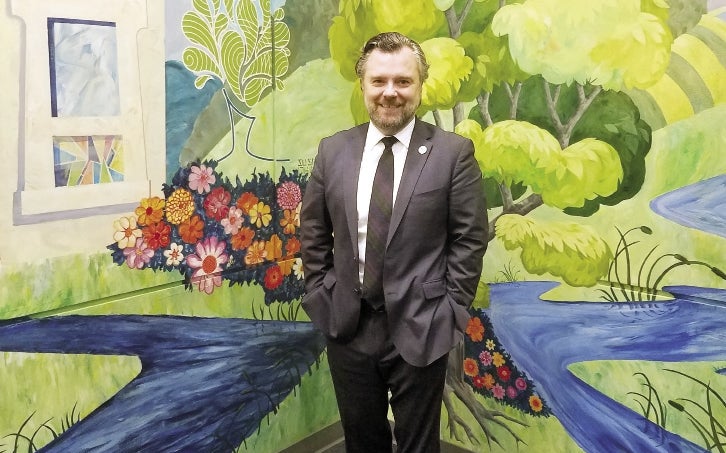Stephen Kerrigan officially took over the reins at the Kennedy Community Health Center from Antonia McGuire, who led the organization for 11 years.
Get Instant Access to This Article
Subscribe to Worcester Business Journal and get immediate access to all of our subscriber-only content and much more.
- Critical Central Massachusetts business news updated daily.
- Immediate access to all subscriber-only content on our website.
- Bi-weekly print or digital editions of our award-winning publication.
- Special bonus issues like the WBJ Book of Lists.
- Exclusive ticket prize draws for our in-person events.
Click here to purchase a paywall bypass link for this article.
On July 2, Stephen Kerrigan officially took over the reins at the Kennedy Community Health Center from Antonia McGuire, who led the organization for 11 years. Kerrigan had spent the bulk of his career working in politics and government, including running for lieutenant governor in 2014 and organizing the inaugurations for former President Barack Obama. The bulk of his time in government, though, was spent as a senior aide for Sen. Edward Kennedy (D-MA), for whom the center is named.
Why did you want to lead Kennedy CHC?
The mission of the entire organization. The idea here is there is an entire sector of the healthcare system designed to provide affordable health care, regardless of your ability to pay. To me, that is a worthy cause to devote my time and energy.
I had worked for Sen. Kennedy for a long time, and the idea of being able to carry on that living legacy of his to provide health care to all on a daily basis was an exciting prospect for me.
Do you feel his presence while you are working at the center?
I feel him when I walk around and talk to our patients. I feel him when I see the incredibly dedicated staff, who never met and don’t know much about him, but they are every day the living embodiment of the work he did. He is always a little bit with me as a guiding force.
Is this work up to his standard?
I think about him when I think about the challenges we face. He always looked at challenges the way I do, which are opportunities to do things differently. I learned a lot at his side and learned a lot about leadership and always striving to do what must be done to serve the people.
I feel his inspiration and influence in a lot of the work we do.
I started working with him three days before my 18th birthday and stayed for 14 years. I stayed close to him for a number of years until his passing. There is very little of my professional life not influenced by the time I spent working with him or knowing him as a mentor and friend.
What Kennedy CHC's future?
Twenty years ago, 50 federally qualified community health centers served 350,000 Massachusetts patients. Now, there are 38, but we serve 1.1 million Bay Staters.
The future is our healthcare delivery system will be divided into a few buckets: big hospital systems, big primary medical provider groups, and community health centers. Community health centers provide care for 29 million Americans. I see my job as preparing us for the future opportunities for growth as we take over a bigger part of the healthcare market.
Is it tougher, with the loss of 12 centers?
It is not so much a loss, as a consolidation, as we went from 350,000 patients to 1.1 million. Kennedy CHC has expanded over that time: We added Framingham about 15 years ago, and five years ago, we added Milford. We will grow and expand, and we have an eye on sustainability, too, to make sure we can continue to provide quality health care.
Where does your funding come from?
Of our $36-million budget, about 67% comes from patients; 28% comes from grants, including our federal contracts; and the rest is almost all donated goods, services and contributions. That funding is relatively stable, but you have to work for it, to make sure you are meeting the criteria for the federal funds.
We would like to see higher reimbursements for the services we provide. We feel like we are being underpaid, especially given the way the rest of the healthcare delivery system keeps asking us to do more. But, I think the government gets it, and I believe the decision makers on Beacon Hill and Capitol Hill eventually will reimburse us at the rates we need.
How is care changing?
We are moving toward total integration of services. In Worcester, we have primary care, dental care, pharmacy, behavioral health and – just down the street – optometric care. We have a more full-service approach, including offering WIC, clinical nutrition work, and looking at environmental factors contributing to health issues like asthma.
Like other healthcare providers, we are moving away from fee-for-service and starting to look at whole population health, including social determinants of health.
Despite all the challenges health care and nonprofit community health centers like this face every year, I’m excited for the prospects lying ahead.
This interview was conducted and edited for length and clarity by Brad Kane, WBJ editor.

